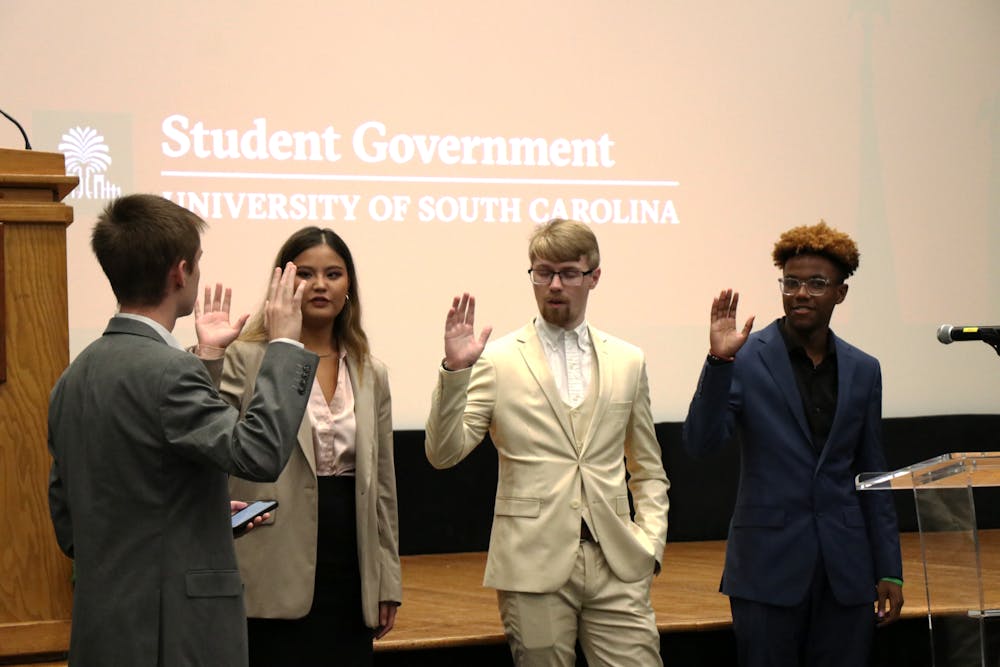Student Government executives released their plans to fulfill campaign goals and propose new initiatives, such as improvements to parking, Wi-Fi and game day safety, through the 2023-24 strategic plan.
The plan is released every year by the current executive officers of Student Government and details their priorities and proposals for the year and how they plan to achieve them.
“This is our way of honing in on what our goals were for this year. We laid out not just what we want to do, but how we want to do it,” said Student Body President and fourth-year public relations student Emmie Thompson.
The strategic plan also serves as a way for the student body to hold the Student Government accountable for how their goals have been accomplished throughout the academic year.
"All of these are super, super attainable. And so it's a way for students to be able to look at what we want to do this year and hold us accountable on certain pieces,” said Speaker of the student senate and fourth-year criminal justice and international studies student Cameron Eubanks.
One of the main priorities addressed in this year's plan is issues with parking, which the executive officers said was one of the most frequent complaints they receive from the student body.
The plan details a change to the current parking system that will offer a limited amount of discounted parking passes to students who demonstrate a financial need.
Student Government wants to have a parking guide created for both first-year and off-campus students that showcases the best places for them to park based on the college where they have a majority of their classes, according to Thompson. They also are advocating for an increase in communication from the parking office to the student body about the availability of parking passes and when they go on sale for the next school year.
The executive officers also said that another major priority for the rest of their term is the Wi-Fi situation on-campus.
The university is currently in the process of completing their network modernization plan that would upgrade existing Wi-Fi infrastructure across campus, the university website said.
The modernization plan is divided into three phases. Phase one, which was completed in 2020, was for the on-campus residence halls. Phase two, which is in progress, is for on-campus buildings, and areas covered in phase three have not yet been announced.
Phase two is expected to be completed by the fall of 2024 with updates at Thomas Cooper Library and Russell House proposed as being completed last during the summer of 2024 due to heavy amounts of foot traffic, which Thompson said is frustrating to the large volume of students that frequent the two buildings.
One of Thompson’s biggest personal goals and a cornerstone of her campaign was to increase game day safety. Thompson said she hoped to add chargers and charging stations at the stadium as well as partnering with Uber to offer discounted rides to and from the stadium.
The addition of chargers and charging stations were recently piloted for the last home game against Mississippi State on Sept. 23.
“I’m super excited, actually, (that) last home game, all the chargers were checked out. So it meant that every student who needed a charge, needed their phone to be charged, had the opportunity to, and they were turned back in which is also important,” Thompson said.
There are also plans in place with Student Government and university officials to pilot the Uber program during the final home game against Clemson on Nov. 25, according to Thompson. The success and response from the student body will ultimately determine whether it should be permanently implemented in the future using administrative funds.
The proposed plan with Uber would offer discount vouchers on an application basis for students to create for safer transportation to and from the stadium for students on game days.
The financial portion of the plan focuses on making student funding more equitable and making funding requests more user-friendly in large part due to the student government running out of funding for student organizations at the end of last school year.
Student Body Treasurer Hannah Augsbach-Lamma said that her focus is on working with the student senate to pass legislation to level the playing field for student organization funding and ensure that funds will be less likely to run out.
Augsbach Lamma said adding more comptrollers was important to creating more outreach to student organizations and an increase in the number of treasurer’s workshops.
“We've been working hand in hand with the senate a lot to try to get legislation to pass in order to make funding more equitable, but then also just focusing a lot on outreach,” Augsbach Lamma said. “I think by reaching that broader number of organizations and people that's going to be what makes funding more equitable.”
Internally, both Thompson and Eubanks said that student government is not meant to be a political organization but that it is a service organization.
A major goal for the organization this year, according to Eubanks, is rebuilding relationships with students, administration and other university stakeholders after receiving a negative response for the amount of politically-charged legislation that was passed in the senate in recent years.
“It's definitely been a building year for (the) senate, rebuilding back our bridges with faculty senate, with staff senate, with the higher ups in the administration, even with the board of trustees themselves — making sure that we're passing legislation that actually will impact the student experience,” Eubanks said.

